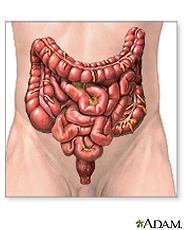 |
 |
 |
Other Health Topics:

-
Related Topics
-
Go Local
- Services and providers for Gas in the U.S.
-
National Institutes of Health
- The primary NIH organization for research on Gas is the National Institute of Diabetes and Digestive and Kidney Diseases
Everyone has gas. Most people produce about 1 to 4 pints a day and pass gas about 14 times a day. Passing gas through the mouth is called belching or burping. Passing gas through the rectum is called flatulence. Most of the time gas does not have an odor. The odor comes from bacteria in the large intestine that release small amounts of gases that contain sulfur.
Gas in the digestive tract comes from two sources: air that you swallow and the breakdown of undigested food by bacteria in the large intestine. Certain foods may cause gas. Foods that produce gas in one person may not cause gas in another. Drinking lots of water and non-fizzy drinks and chewing food more to lessen the amount of air you swallow when you eat can help reduce gas. For people with lactose intolerance, avoiding milk products will help.
National Institute of Diabetes and Digestive and Kidney Diseases
-
Gas in the Digestive Tract
 (National Institute of Diabetes and Digestive and Kidney Diseases)
(National Institute of Diabetes and Digestive and Kidney Diseases)
| Basics | Learn More | Multimedia & Cool Tools |
|---|---|---|
|
|
|
| Research | Reference Shelf | For You |
-
Overviews
-
Belching, Bloating and Flatulence(American College of Gastroenterology)
Also available in Spanish
- Gas and Gas Pains(Mayo Foundation for Medical Education and Research)
-
What I Need to Know about Gas

 (National Institute of Diabetes and Digestive and Kidney Diseases)
(National Institute of Diabetes and Digestive and Kidney Diseases)
Also available in Spanish
-
Belching, Bloating and Flatulence(American College of Gastroenterology)
-
Prevention/Screening
- Controlling Intestinal Gas(International Foundation for Functional Gastrointestinal Disorders)
-
Anatomy/Physiology
- Atlas of the Body: The Digestive System(American Medical Association)
-
Your Digestive System and How It Works
 (National Institute of Diabetes and Digestive and Kidney Diseases)
(National Institute of Diabetes and Digestive and Kidney Diseases)
Also available in Spanish
-
Clinical Trials
-
ClinicalTrials.gov: Flatulence
 (National Institutes of Health)
(National Institutes of Health)
-
ClinicalTrials.gov: Flatulence
-
Journal Articles
References and abstracts from MEDLINE/PubMed (National Library of Medicine)
- Article: Meta-analysis of the need for nasogastric or nasojejunal decompression after...
- Article: Effect of a balanced mixture of dietary fibers on gastric...
- Article: In school-aged children a combination of galacto-oligosaccharides and Lactobacillus GG...
- Gas -- see more articles
-
Directories
- GI Physician Locator(American College of Gastroenterology)
-
Organizations
- American College of Gastroenterology
- American Gastroenterological Association
-
National Digestive Diseases Information Clearinghouse

-
National Institute of Diabetes and Digestive and Kidney Diseases

-
Children
- What's a Fart?(Nemours Foundation)
- Why Do I Burp?(Nemours Foundation)
- Women Return to top
| Home | Health Topics | Drugs & Supplements | Encyclopedia | Dictionary | News | Directories | Other Resources | |
| Disclaimers | Copyright | Privacy | Accessibility | Quality Guidelines U.S. National Library of Medicine, 8600 Rockville Pike, Bethesda, MD 20894 National Institutes of Health | Department of Health & Human Services |
Date last updated: 14 July 2008 Topic last reviewed: 12 July 2008 |






